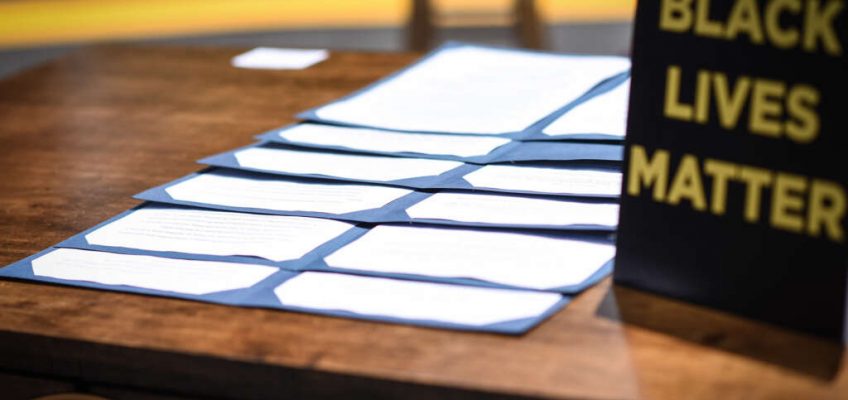“Will the next mayor treat reparations as the moral and economic necessity that it is, or let this moment pass, despite the will of the people?”
Racial equity legislation on the mayor’s desk at City Hall in 2020. (Michael Appleton/Mayoral Photography Office)
In Tulsa, Oklahoma, something historic happened this spring. The city’s mayor, Monroe Nichols, unveiled a bold $105 million plan for reparations to the survivors and descendants of the 1921 Tulsa Race Massacre.
Here in New York City, we also face a defining question: will the next mayor treat reparations as the moral and economic necessity that it is, or let this moment pass, despite the will of the people?
Reparations in New York are not a fringe idea, as many media and political elites would have you believe. The recent survey conducted by New Yorkers for Reparations and Liberation Ventures shows that 48 percent of New Yorkers support reparations, and 70 percent would support or consider a candidate who champions them. This growing public consensus mirrors what advocates have long known: reparations are not only possible, they are inevitable.
New York is leading the way in advancing reparations and reparative justice in many ways. The New York State Community Commission on Reparations Remedies, formed after years of advocacy from grassroots organizers, has been working over the past year to gather community input through public hearings. The New York City Council, through the Commission on Racial Equity (CORE), is developing its own reparations process.
Nationally, Representatives Ayanna Pressley and Summer Lee are advancing HR-40, legislation that would establish a national reparations commission. Their leadership reflects the moral clarity needed in this moment.
The groundwork has been laid; now we need the political leadership to act.
Which is why we hosted a Mayoral Forum on Reparations directly across from Seneca Village, now known as Central Park, which was once a thriving Black community that was taken via eminent domain. There, four candidates—Michael Blake, Zellnor Myrie, Zohran Mamdani, and Brad Lander— each declared their support for reparations.
They didn’t mince words:
“Closing the racial wealth gap is not just a better deal for Black New Yorkers, it’s a better deal for all New Yorkers.” -Brad Lander
“We as a city have to ensure that we are connecting the wrongs of the past.” – Zellnor Myrie
“New York City actively participated in the slave trade; it should reconcile and repair this legacy.” – Zohran Mamdani
“We have to address economic injustice at the forefront, it’s simply too expensive to live in New York because of historical injustice.” – Michael Blake.
To understand why reparations are urgently needed, we must begin with a simple truth: Black wealth in this city was not lost, but taken. Two hundred years ago, on the land that is now Central Park, a thriving, predominantly Black community called Seneca Village stood. By 1850 it was home to 20 percent of all Black property owners in the state, and in 1853, the state decided to take it through the power of eminent domain, and by 1857 the entirety of Seneca Village was erased, not by mob, as Elie Mystal explained, but by design, by law.
This pattern of dispossession evolved into policies across the city and state that robbed Black New Yorkers of their wealth; redlining, racial covenants, urban renewal, underfunded schools, segregated hospitals, discriminatory hiring, and unequal wages. The result is a staggering Black-white wealth gap, with the median wealth for white New Yorkers is $320,000, for Black New Yorkers, it’s just $2,800. That is not a gap, as our coalition member and long-time reparations leader, Nkechi Taifa, reminds us, it is a chasm.
New York City is not absent from the legacy of American slavery, far from it. In 1712, the city became home to its first slave trading post at the intersection of Pearl Street and Wall Street, the very heart of what would become America’s financial district. Long before Seneca Village, there was “The Land of the Blacks,” also referred to as the Negro Frontier, a documented Black presence in New York dating back to the early 1600s who would also eventually be displaced. This rich history was nearly erased until the rediscovery of the African Burial Ground near Chambers Street at the foot of City Hall Park.
The very name “New York,” along with the state capital “Albany,” comes from James Stuart, the Duke of York and Albany. He, along with his brother King Charles II, co-founded the Royal African Company—a powerful enterprise that dominated the transatlantic slave trade, exchanging enslaved Africans for goods as part of the triangular trade.
As a major port city, New York positioned itself at the center of this global system, helping to build the wealth of the English Crown, New York’s merchant class, and Southern plantation economies. The city’s industrial processing and shipping infrastructure directly fueled and profited from slavery, until New York legally abolished slavery in 1827.
Given this history, New York should be leading the national call for reparations, in truth, policy, and wealth redistribution. The institution of slavery as we know it would not have thrived without New York’s central role in financing, processing, and profiting from Black bondage. New York has always been a city of ambition. It’s time we match that ambition with justice.
Nicole Carty is a Brooklyn resident, New Yorkers for Reparations coalition member, and executive cirector of Get Free. Rashid Littlejohn is a Staten Island resident, New Yorkers for Reparations coalition member, and vice president of the Anti-Negro Defamation League.
The post Opinion: Why Reparations Must Be A Priority Issue in the NYC Mayoral Election appeared first on City Limits.


Leave a Reply